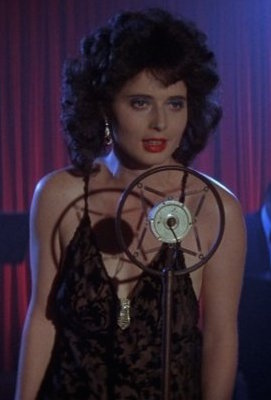Soundtracking: "Blue Velvet"
 Wednesday, July 12, 2017 at 10:30AM
Wednesday, July 12, 2017 at 10:30AM This week, Chris Feil's soundtrack series covers a David Lynch classic...
 David Lynch has used music to genius effect over his career, particularly drawing from 50s and 60s crooners to create a cinematic world displaced in time. But Lynch’s most definitive use of preexisting songs is in one of his most narratively focused masterpieces, Blue Velvet. This is the best example of how he distorts the wholesomeness of the sound to reveal darker tones beneath performative American culture.
David Lynch has used music to genius effect over his career, particularly drawing from 50s and 60s crooners to create a cinematic world displaced in time. But Lynch’s most definitive use of preexisting songs is in one of his most narratively focused masterpieces, Blue Velvet. This is the best example of how he distorts the wholesomeness of the sound to reveal darker tones beneath performative American culture.
Music is as much a piece of this suburban facade as any of Lynch’s hellscapes, announcing as much when it fades from Angelo Badalamenti’s operatic overture to Bobby Vinton’s title classic. A placid sky descends upon a thorny rose bush, gorgeously staining the picked fence’s rigid sterility like how Lynch poisons our relationship to the music. Vinton’s voice is tinny in its soulfulness, a swingy sanitized ode that matches Lynch’s picturesque neighborhood for quaintness. Musically, it feels as manufactured as this idyllic vision before us until it fades and morphs into something beastly beneath the manicured, bland exterior.
The song returns as the film’s tragic heroine Dorothy Vallens’s calling card in her lounge act. Isabella Rossellini is decidedly not a singer (her unflinching vocal commitment just part of one brave as hell performance), adding to the surreal and off-kilter effect Lynch achieves. The film is as spellbound with her vampire-angel vision as Kyle MacLachlan’s young Jeffrey, matching his fascination with her but maybe not his troublesome gaze. This smooth jazzy rendition is slightly indistinguishable from the original, creating some jarring distance from how it was used at the film’s opening. As atonal as the sounds are to one another between versions, so are Lynch’s visuals within the same color palate.
Later the number distorts as Jeffrey returns to see her perform, this time as much attention paid to Dennis Hopper’s tearful response as Dorothy’s bruised crooning. The film doesn’t reconcile the tenderness it alludes between Frank and Dorothy, but here we discover with Jeffrey that the horrifying picture of abuse that we have seen may not be the complete picture. Again, the song reminds of the film’s opening and we understand further of just what kind of suppressed psychosis Lynch aims to expose.
But Blue Velvet’s is even more iconic for Dean Stockwell’s slinky rendition of Roy Orbison’s “In Dreams”. Stanton delivers a strange impromptu drag performance that transfixes all, but is more of a nightmare lullaby for the musically soothed Frank, with Dennis Hopper hinting further at an undefined internal struggle. Here Lynch once again relies on mid-century vocalists to subvert an American ideal and places it just left of center enough to redefine the song for the audience. He would return to Orbison in Mulholland Drive to convey an unspoken emotional undercurrent to even more elusive effect.
What is it in David Lynch’s execution that can turn an innocuous tune like “In Dreams” into something otherworldly and disquieting? It’s partly contextual, the way he pairs ghoulish imagery with tender melodies to reflect the opposite quality in the sight and sound. It’s also his uncanny ability to create a moment so enigmatic that it becomes less about the explanation and more about the sheer bizarre experience. But even as we watch nonplussed, his enigmas are loaded with brain-racing meaning. Music remains one of his most utilized tools to create this singular effect.
The film ends at its most dreamlike, with Julee Cruise’s “Mysteries of Love” orchestral airiness helping create a hazy new world washed clean of sin. But with the final notes of Dorothy’s “Blue Velvet” coming in, Lynch suggests that the idea that we can escape these demons is another suburban illusion.
Blue Velvet is now streaming on Hulu and Amazon Prime.
Previous Soundtracking Favorites:
A Mighty Wind
Drive
Big Little Lies
Best Worst Thing...
American Honey
but all installments can be found here!



Reader Comments (1)
Truly one of the best soundtracks..... EVER!!!!!!